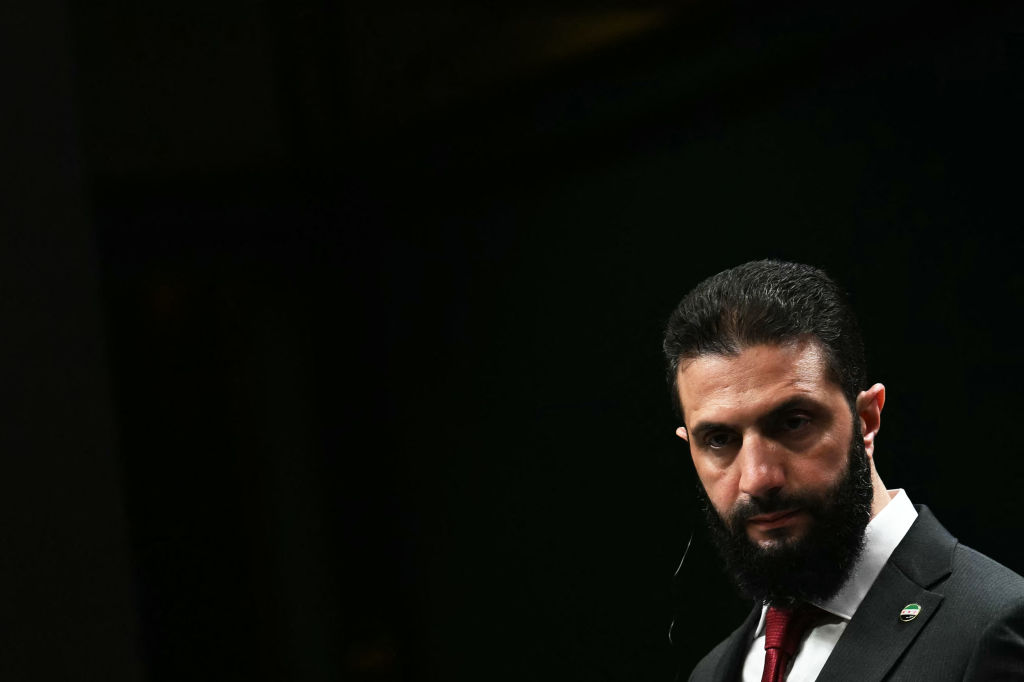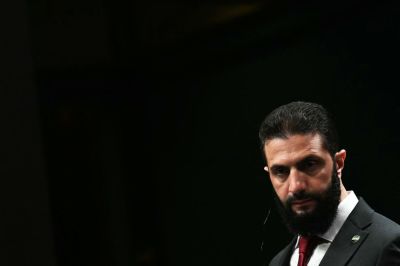Happy Friday! A recent study found that bonobos, one of our closest living relatives, can intuit when humans are clueless and will try to lend a hand when they think someone is struggling. They would certainly be busy in Washington.
Quick Hits: Today’s Top Stories
- President Donald Trump signed an executive order sanctioning the International Criminal Court (ICC) on Thursday, accusing the body of anti-American and anti-Israel bias. The move imposes financial and travel restrictions on individuals investigating American citizens or allies for the court, which in November issued arrest warrants for Prime Minister Benjamin Netanyahu and other Israeli leaders over the war against Hamas in Gaza—a move that the White House said “set a dangerous precedent” and endangered U.S. personnel. Neither the U.S. nor Israel are members of the ICC, but several European countries are among its signatories.
- The Treasury Department imposed sanctions on an international network—including several vessels and individuals in China, India, and the United Arab Emirates—that it accused of facilitating illicit Iranian oil sales to China on Thursday. According to U.S. officials, proceeds from the oil sales were being used to fund terrorists and proxy groups by way of Iran’s Armed Forces General Staff and its front company, Sepehr Energy Jahan Nama Pars. The measures followed President Trump’s presidential memorandum earlier this week reinstating a “maximum pressure” sanctions campaign aimed at curbing Iran’s nuclear program.
- A federal district court judge in Massachusetts temporarily paused the Trump administration’s buyout offer to federal employees on Thursday, after four unions requested a restraining order to suspend the plan’s implementation. The buyouts, part of Department of Government Efficiency head Elon Musk’s efforts to reduce the size of the federal government, included full pay and benefits through September for employees who voluntarily resigned. The injunction came just hours before a Thursday deadline to take the offer, with at least 60,000 people accepting so far. Judge George O’Toole Jr. will hold a hearing on Monday to determine whether the suspension will continue.
- Federal Election Commission Commissioner and Chair Ellen Weintraub said Thursday that President Trump sent her a letter removing her from her position, effective immediately. Weintraub, a Democrat who has served as a commissioner for the independent regulatory agency since 2002, indicated plans to push back on the dismissal that she described as illegal. She has previously voted to investigate Trump multiple times, including over alleged Russian interference in the 2016 election and Trump’s promotion of his businesses during his campaign. Weintraub’s term expired in 2007, but commissioners are allowed to remain on the FEC panel until they are replaced by a Senate-confirmed presidential nominee.
- Multiple outlets reported Thursday that the Trump administration plans to cut all but about 290 of the more than 10,000 positions at the U.S. Agency for International Development (USAID). The significantly reduced staff would be responsible for continuing a small number of live-saving programs alongside local staffers abroad. Unions representing USAID employees filed a lawsuit attempting to block the mass terminations on Thursday, calling the effort “unconstitutional and illegal” and arguing that only Congress has the authority to dismantle the agency.
- The Senate voted 53-47 along party lines to confirm Russell Vought as head of the Office of Management and Budget on Thursday. Vought—one of the key architects of the Heritage Foundation’s Project 2025 policy blueprint—faced significant pushback from Senate Democrats, who held an overnight session into Thursday morning in protest of his bid. As head of the budget office, he’s expected to continue the Trump administration’s efforts to slash funding and purge personnel.
Uncertainty in Rebel-Run Syria

“We should all understand that this is a transitional stage, and it is part of a political process that requires true participation by all Syrian men and women, inside and outside the country, so that we can build their future with freedom and dignity, without marginalization or sidelining.”
You’d be forgiven for thinking the declaration was made by the leader of a burgeoning secular democracy. But it was instead the promise of newly installed Syrian President Ahmed al-Sharaa, the former head of an al-Qaeda offshoot, in his first address to the nation last week. As the country’s new government takes shape, Syrians are waiting to see if al-Sharaa—also known as Abu Mohammad al-Jolani—lives up to his vows to deliver inclusive and democratic governance.
After a yearslong campaign to distance himself from his radical roots, al-Sharaa is now seeking legitimacy from the international community as the formal leader of Syria. But some analysts question the sincerity of his pivot and fear that despite the rhetoric, Syria could witness the installation of an authoritarian, Islamist regime. Others are cautiously optimistic that the new government will reflect a full break from radicalism. Meanwhile, the prospect of a U.S. military withdrawal is raising concerns about the future of America’s allies and counterterrorism efforts in Syria.
Over the last few weeks, al-Sharaa and Hay’at Tahrir al-Sham (HTS), the Islamist group that al-Sharaa led until he ascended to the presidency, have gone about formalizing their de facto control of the Syrian government. The Syrian parliament was dissolved last week and the country’s 2012 constitution was nullified. In his address last Thursday, al-Sharaa laid out a vision of a unified Syria rising from the ashes of the civil war: “I address you today not as a ruler but as a servant for our wounded homeland, striving with all power and will I have been given to realize Syria’s unity and renaissance.”
In practice, that unity will be much harder to achieve. Despite controlling Damascus, al-Sharaa’s coalition holds less than half of the country’s territory. Al-Sharaa announced plans to dissolve all armed groups into the state during a meeting with other rebel leaders last week, but not all of Syria’s various, multiethnic factions are on board. The Kurdish-dominated Syrian Democratic Forces (SDF)—which fights alongside U.S. troops to combat the Islamic State—still controls vast swaths of northeast Syria. And in the southwest, Druze militias hold key positions. Both Kurdish and Druze leaders have said they have no plans to surrender their arms or submit to a centralized government.
During last week’s gathering, al-Sharaa also outlined the creation of a small council to fulfill legislative functions until a new constitution is drafted. The transitional government would be formed “based on the participation of all segments of society in running the country,” he added in a recent interview with The Economist, though the posts have thus far been filled largely by HTS loyalists. When asked whether Syria would become a democracy, the militant leader answered: “If democracy means that the people decide who will rule them and who represents them in the parliament, then yes Syria is going in this direction.”
But some observers aren’t holding their breath waiting for the arrival of a democratic Syria. “He can continue this notion that there’s going to be democratic elections, but he hasn’t said when, and perhaps by the time you have elections, they’ll have consolidated everything so that it’s just a shoo-in for him,” Michael Rubin—an American Enterprise Institute senior fellow who has spent time in Kurdish-controlled parts of Syria—told TMD. “We’ve got to stop being fooled by these guys’ rhetoric. Remember, a reformed al-Qaeda leader isn’t a democrat.” Al-Sharaa said this week that it could be four to five years before the country holds elections.
Other analysts have expressed cautious optimism about the HTS government’s apparent move away from radical Islam. “Why I take this change more seriously [is] because it didn’t happen suddenly,” Ibrahim Al-Assil, a senior fellow at the Middle East Institute, told TMD. “It didn’t happen over one day or one night or when they took over Damascus. This change has been going on for at least a decade.” Al-Assil argued that HTS began to shed its extremist ideology as it took on a governing role in the northwest province of Idlib, which has been under HTS control since 2017. The rebel group’s record is far from flawless—some religious minorities reported persecution in the opposition-led territory—but they did demonstrate some signs of moderation, including by not imposing a dress code on women.
That trend seems to be mostly on track to continue as the Sunni faction consolidates control over swaths of the religiously and ethnically diverse country. “There are violations that are happening, and there is sectarian tension, and there have been some kidnapping and killing inside Syria,” Al-Assil said of the last two months. “However, they are not systematic. Clearly, they are not [happening] because of orders from the leadership. It’s the other way around. The leadership is trying to limit that.”
But al-Sharaa’s effort to shed his jihadist origins is likely driven, in part, by pragmatism as he looks abroad for support. And after some initial hesitancy, regional powers have begun warming to his new government. On Sunday, he met with Saudi Arabian Crown Prince Mohammed bin Salman in Riyadh during his first foreign trip as president, and last week, the Emir of Qatar Tamim bin Hamad Al-Thani became the first foreign leader to visit Damascus since the rebel takeover.
Al-Sharaa also paid a visit to Ankara to meet with Turkish President Recep Tayyip Erdoğan this week. Turkey supported the two main rebel groups that led Assad’s overthrow and now appears eager to cash in on his goodwill, with Erdoğan looking to Damascus for support in breaking Kurdish control over northeast Syria. “We discussed the threats that would prevent the unity of Syrian lands in northeastern Syria,” al-Sharaa said after his meeting with the Turkish leader, alluding to the SDF-run territory.
Whether or not Erdoğan’s designs on Syria come to fruition largely depends on the United States. Some 2,000 U.S. troops are currently deployed alongside local partners, including the SDF, to prevent an ISIS resurgence. But the Pentagon has reportedly started to draw up plans to withdraw troops—a move that would leave the U.S.’s Kurdish allies vulnerable to advances by Turkey and Turkish-allied forces. “If the United States pulls out, that does give the Turks more freedom of action in Syria to go after the Kurds,” Raphael Cohen, the director of the Strategy and Doctrine Program at the RAND Corporation, told TMD.
The SDF, which runs prisons holding thousands of ISIS fighters, has already had to divert its soldiers to fight Turkish proxy forces. A U.S. departure would complicate its counterterrorism efforts further. “It’s like controlling 95 percent of a forest fire and then picking up and going home,” he said of a U.S. withdrawal. “That’s what we’re doing, but maybe leaving the gasoline behind.”
The specter of an uncontrolled jihadist resurgence is just one of the potential challenges facing Syria as the new government in Damascus consolidates control. For now, the country’s religious and ethnic minorities—including Kurds, Alawites, and Christians—are watching al-Sharaa closely to see whether he backs up his moderate rhetoric with action.
“Let’s see what happens a year or two years or longer from now, once HTS regains more of its strengths, consolidates its grasp on the country, and has more cards to play, both internally and abroad,” Cohen said. “That’s going to be the true test of whether or not HTS is truly reformed, or whether or not it’s a wolf in sheep’s clothing.”
Worth Your Time
- Writing for Law and Liberty, Andy Smarick (who recently contributed to the Dispatch Debate series) explores how Ivy League graduates are not as prevalent in elite circles as they once were, with many public-sector leaders hailing from state schools instead. “My findings challenge the notion that the graduates of a small number of elite private schools dominate our leadership ranks and show the importance of geography when considering leadership development. Across the public offices, the same three themes held whether looking at undergraduate or graduate education. First, these individuals were likelier to have gone to public than private institutions. Second, they were likelier to have been educated in the states they served than in other states—meaning they didn’t need to go hundreds or thousands of miles away to be schooled for leadership. Third, and perhaps most strikingly, they were likelier to have gone to public flagship universities than Ivy+ schools,” he wrote. “At the undergraduate level, the 12 publics most attended by these leaders can claim more graduates than the 12 Ivy+ schools. And the publics are not just Cal-Berkeley and the University of Virginia. The Universities of Texas, Arkansas, Georgia, Mississippi, and Wyoming each educated more than Stanford or Princeton. Auburn, Indiana, and LSU educated more than Brown, Columbia, and Penn.”
- Elon Musk’s “move fast and break things” approach to overhauling the federal government is undeniably disruptive. But could it also pose a threat to national security? James Goldgeier and Elizabeth N. Saunders argue the answer is yes in a piece for Foreign Affairs. “Setting aside the legality of DOGE’s moves, some of which appear unlawful and unconstitutional on their face, and the dangerous privacy risks to Americans from the breach of sensitive data, there is another cause for alarm: Musk’s activities present a national security nightmare,” they wrote. “Consider what the intelligence agencies of U.S. allies and adversaries see when the American president grants sweeping access to the basic systems that make the U.S. government run to a team of young people who have no government experience, who may not have been put through standard personnel vetting processes, and who work for an unelected figure with extensive personal financial interests in national security spending. American adversaries surely see an espionage and blackmail bonanza.”
Presented Without Comment
Reuters: Trump to Create Religious Office in White House, Target ‘Anti-Christian bias’
Also Presented Without Comment
NBC News: Cracker Barrel Eggs on Waffle House over Surcharge: ‘Nothing hospitable about that’
In the Zeitgeist
Two more days until Super Bowl Sunday! Even though a Super Bowl with the Kansas City Chiefs feels all too familiar, we’re holding out for a play as good as this one:
Toeing the Company Line
- On the podcasts: Jonah Goldberg and Steve Hayes join Sarah Isgur on The Dispatch Podcast to discuss tariffs, USAID, Donald Trump’s plans for Gaza, and more.
- On the site: James Broughel explains plans for a U.S. sovereign wealth fund, Charles Hilu reports on Senate Republican alignment in support of Trump’s Cabinet nominees, and Kevin Williamson considers the adversarial character of American conservatism.
Let Us Know
Do you think a U.S. withdrawal from Syria is advisable?









Please note that we at The Dispatch hold ourselves, our work, and our commenters to a higher standard than other places on the internet. We welcome comments that foster genuine debate or discussion—including comments critical of us or our work—but responses that include ad hominem attacks on fellow Dispatch members or are intended to stoke fear and anger may be moderated.
With your membership, you only have the ability to comment on The Morning Dispatch articles. Consider upgrading to join the conversation everywhere.